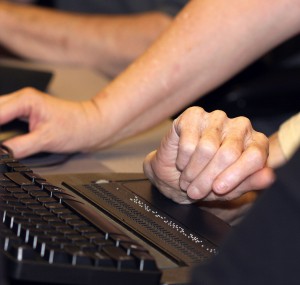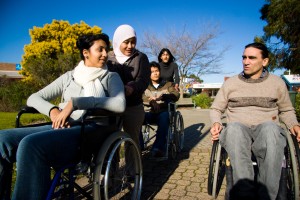The flight across the Atlantic Ocean to the U.S. was just another step in the journey for Fadi Hajjar, a graduate student and former Fulbright Fellow from Lebanon and is blind. Months before, Fadi began the journey by taking a chance and seizing an opportunity. Fadi received his Master’s degree in Political Science from the American University of Beirut (AUB) and wanted to take his education further and study abroad. “I was interested in a Ph.D. program, but when I learned about the Master’s in Conflict Resolution being offered through the Fulbright Program in the U.S., (sponsored by the U.S. Department of State), I jumped at the opportunity”, says Fadi, “and I don’t regret it at all”.
Fadi, who lives with his family at home in Lebanon is very independent especially when it comes to decisions about his future. He is part of a growing trend of people with disabilities from the Middle East and North Africa who are choosing to study in the U.S. Choosing to live alone in a foreign country – new places, sounds, foods, language and culture, while pursuing an advanced degree – was ultimately his decision and his family was very supportive. He admits he didn’t know much about disability culture or what types of disability-related accommodations were available in the U.S. “I didn’t know what was available to ask for”. But, he says, “it was a very, very…easy going process. [The Fulbright program representatives] made it as easy as possible and I was so impressed with their work.”
Fulbright and university representatives worked with Fadi to arrange the necessary disability accommodations he needed from the interview process, through admission to the university, to life on campus. “On my application I wrote that I was visually challenged – they thought I had low vision. When I arrived and they found out that I am totally blind, it was funny, even for me. For the university staff, it was an emergency and they acted very quickly to make sure I had the accommodations I needed. They asked, ‘What do you want us to do to make it easy for you to study?’ They went beyond what I asked for. I thought, ‘Oh, my, I am really privileged’… they allocated funds for me to get some equipment and software and a personal reader for me. It was really amazing.”
“When I went to the U.S., I discovered that
there [are] academic support centers, not
only for the visually disabled, but also for
other…students with disabilities”
Fadi worked with the disability support services office at his university and with the Fulbright Office at the State Department to make sure he had the tools and support necessary for him to succeed and get the most out of his academic and cultural experience. Nearly every university and college in the U.S. has either an office or designated person to assist students with disabilities on campus. “When I went to the U.S., I discovered that there [are] academic support centers, not only for the visually disabled, but also for other…students with disabilities”. Fadi admits that sometimes it was difficult to adapt to new accommodations, but, like everything else in an international exchange experience, he approached each new challenge as an opportunity to learn and grow.
“After going to the U.S., I know more about American people. I know more about the U.S. But, the most important and significant knowledge I acquired during my presence in the U.S. was about myself. I am more positively aware of my identity.” He learned how to bridge the gaps between different cultures, beliefs and ideas without losing his identity. “[T]his was the cultural dimension and what experiences and international exchange are all about.”
Fadi, who studied for a Master’s Degree in Virginia at Eastern Mennonite University, returned to Lebanon full of advice and suggestions for other students from the Middle East and North Africa. “You have to go with an open mind and an open heart and you have to learn to accept others. You don’t have to agree with them, but accept who they are and feel free to express yourself. You can be yourself in the U.S.” Fadi also suggests getting to know more about the American culture, people and systems, and creating a real exchange experience by learning about and from each other.
“I do my best to be independent, but…
I cannot deny that I have a disability – I didn’t hesitate
to ask for help when I needed it.”
Being a student with a disability can be very empowering in the U.S. To get the most from the experience, Fadi has this advice: “Don’t ever hesitate to ask for help when you need it. You don’t have to be dependent. I do my best to be independent, but sometimes I cannot deny that I have a disability – I didn’t hesitate to ask for help when I needed it.” Fadi also suggests researching information about the university, disability services available, disability laws and rights and disability organizations in the community to make life easier when you first arrive in the U.S.
Fadi returned to Lebanon with his Master’s degree in Conflict Resolution and is readjusting to life in Beirut while pursuing a professional opportunity. His heart and mind are open to the world as a result of his educational experiences in the United States and he has helped create a path for other students with disabilities to follow.
Fadi Hajjar studied at Eastern Mennonite University in Harrisonburg, Virginia as a Fulbright Fellow, sponsored by the U.S. Department of State. Fadi lives in Beirut, Lebanon.
You may contact Mobility International USA for more information on this article
National Clearinghouse on Disability and Exchange
Copyright: Al Jamiat Magazine, 2007/2008 Edition
info@al-jamiat.com
www.al-jamiat.com


